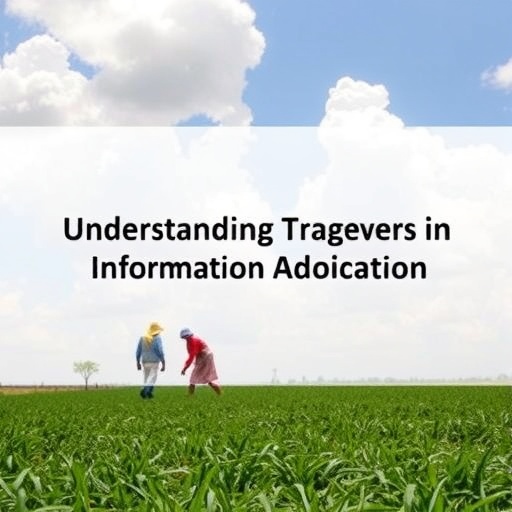In a highly significant study that seeks to enhance the understanding of smallholder farmers’ decision-making processes, researcher S.B. Opiyo dives into the realms of climate information services (CIS). The paper, published in Discov Sustain, explores not just the accessibility of crucial climate data but also the willingness of these farmers to invest in such information, which can ultimately transform their agricultural practices. This duality of access and willingness to pay unveils a complex interplay of drivers and barriers that influence the adoption of climate-smart agricultural techniques.
The backdrop of Opiyo’s research is the ongoing debate on how the agricultural sector, particularly among smallholders, can adapt to the rapidly changing climate. Climate change is a pressing concern that poses significant risks to crop yields and food security. Thus, allowing farmers to effectively utilize climate information becomes critical. However, mere access to this information does not guarantee its use; understanding the factors that compel farmers to adopt these services is equally important.
At the core of this investigation lies the ‘double-selection probit model,’ an advanced analytical approach that allows researchers to understand both the decision to access climate information and the subsequent decision to pay for it. This statistical model effectively captures the complexities of farmers’ decision-making processes, which are often fraught with uncertainty and influenced by a myriad of factors, including socio-economic characteristics, perceived risks, and personal beliefs about climate change.
Opiyo’s research delves into the demographic aspects of the farmers studied, revealing that age, education, and household size play significant roles in their engagement with climate information services. Younger farmers with higher educational attainment are more likely to engage with climate data, demonstrating a keen willingness to leverage information for better crop management. This trend indicates that educational interventions could be vital in paving the way for better climate information accessibility.
Another significant finding is the farmers’ perception of the reliability and usefulness of the information they receive. When farmers believe that climate forecasts are accurate and tailored to their local contexts, they are more inclined to utilize these services. This trust in the information is essential; without it, even the most accessible climate information becomes practically useless. Thus, enhancing the credibility of climate data sources emerges as a pivotal factor in promoting adoption among smallholder farmers.
The research further identifies financial constraints as a substantial barrier. Many smallholders operate within tight budgets, often prioritizing immediate economic needs over potential long-term benefits derived from adopting new technologies or practices. Therefore, even if farmers have access to climate information, their willingness to pay for it can be limited by their current economic realities. This finding underscores the necessity of employing more targeted strategies tailored to the specific financial contexts of these farmers.
Moreover, community dynamics and social networks also exert considerable influence on individual decision-making related to climate information. Farmers commonly rely on peer discussions and shared experiences to form their opinions on the utility of climate services. Thus, fostering community-wide dialogues and encouraging sharing of success stories can potentially enhance the overall adoption rates of these critical services. Engaging local leaders and trusted figures in this process could further facilitate greater enthusiasm for adopting climate-smart practices.
Technology evolution also plays a crucial role in this landscape. With mobile technology nearing ubiquity, there is a palpable opportunity to leverage mobile platforms for disseminating climate information. However, the challenge remains: how can these digital tools be made user-friendly and affordable for smallholder farmers? Research suggests that mobile information delivery tailored to the specific needs and literacy levels of the farmers may lead to more effective dissemination and usage of climate data.
The study emphasizes that while farmers face numerous barriers, these challenges are not insurmountable. Strategic interventions, such as agricultural training programs, subsidies for climate information services, and improved communication about the benefits of adopting climate-smart practices, can significantly encourage adoption. Additionally, stakeholding organizations, including governmental and non-governmental entities, must work collaboratively to create an environment where smallholder farmers can thrive amidst climatic uncertainties.
The implications of Opiyo’s findings extend beyond the academic realm; they provide valuable insights for policymakers striving to bolster climate resilience within smallholder farming communities. Understanding the key drivers behind farmers’ willingness to engage with climate information enables the design of more effective policies that are sensitive to the unique needs of these communities. Ultimately, this intertwining of research and practical application stands to uplift farmers and fortify food security.
As climate change continues to disrupt traditional agricultural practices, the need for informed decision-making becomes paramount. Smallholder farmers situated in vulnerable agricultural systems require a thorough understanding of weather patterns, pest outbreaks, and other climatic influences. By addressing both access and willingness to pay for climate information, Opiyo’s research paves the way for future studies aimed at improving climate resilience among vulnerable populations.
In closing, the exploration of drivers and barriers within smallholder farmers’ decision-making provides critical insights into enhancing climate information service adoption. The findings underscore the need for a multi-faceted approach, considering not only the availability of information but also the socio-economic and psychological factors that influence farmers’ engagement. As we advance towards a more climate-resilient future, understanding and addressing these complexities will be essential in equipping smallholder farmers with the necessary tools to adapt and thrive.
Subject of Research: decision-making processes in smallholder farmers regarding climate information services.
Article Title: From access to willingness to pay: analyzing drivers and barriers in smallholder farmers’ sequential decision-making on climate information services adoption using the double-selection probit model.
Article References:
Opiyo, S.B. From access to willingness to pay: analyzing drivers and barriers in smallholder farmers’ sequential decision-making on climate information services adoption using the double-selection probit model. Discov Sustain 6, 1267 (2025). https://doi.org/10.1007/s43621-025-01935-x
Image Credits: AI Generated
DOI: https://doi.org/10.1007/s43621-025-01935-x
Keywords: smallholder farmers, climate information services, decision-making, willingness to pay, double-selection probit model, climate resilience, agricultural practices.




